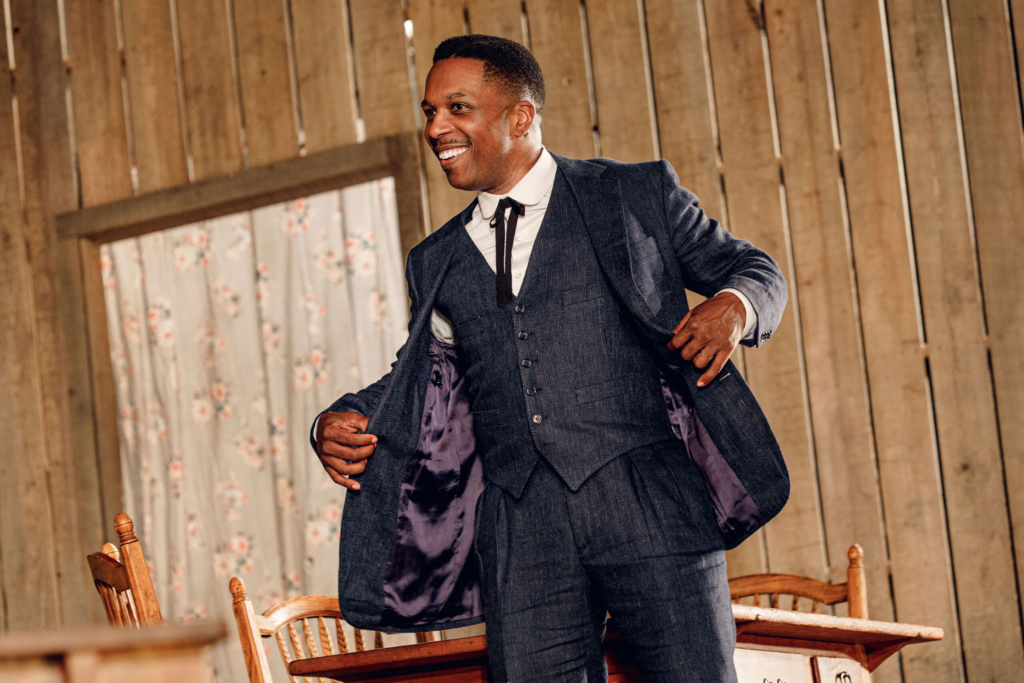Tony Award winner Leslie Odom, Jr. stars in Purlie Victorious: A Non-Confederate Romp Through the Cotton Patch, Ossie Davis’s groundbreaking 1961 satire about a Black preacher’s scheme to reclaim his inheritance and win back his church from a plantation owner. Purlie Victorious is featured in Great Performances’ “Broadway’s Best” lineup on New York City’s PBS station, THIRTEEN. The comedy joins Broadway and Beyond, a special collection of Broadway and other theater and arts programming premiering on-air, online, and on YouTube in May and June. Curated especially for theater lovers, the line-up raises the curtain with Great Performances’ “Broadway’s Best” and includes programs from ALL ARTS, American Masters, and more.

Nominated for six 2024 Tony Awards including Best Revival of a Play, Best Performance by a Leading Actor in a Play (Leslie Odom, Jr.), Best Performance by a Featured Actress in a Play (Kara Young), Best Direction of a Play (Kenny Leon), Best Costume Design of a Play (Emilio Sosa), and Best Scenic Design of a Play (Derek McLane), the production was recorded live at the Music Box Theatre in January 2024.
Before you enjoy the Great Performances production, check out five fascinating facts about the history and recent production of this groundbreaking play.
1) Ossie Davis and his wife Ruby Dee starred in the original 1961 Broadway production of Purlie Victorious.
In addition to writing Purlie Victorious, Ossie Davis played the title role in the original 1961 Broadway production, starring opposite his wife Ruby Dee as Purlie’s love interest, Lutiebelle Gussie Mae Jenkins. The couple reprised their roles in the 1963 film version, Gone Are the Days!, and appeared in numerous plays together, including the groundbreaking original 1959 Broadway production of Lorraine Hansberry’s A Raisin in the Sun. Beyond their success on stage and screen, Davis and Dee were renowned civil rights activists who helped organize the 1963 civil rights March on Washington for Jobs and Freedom and served as its emcees. The 2004 Kennedy Center honorees were deeply committed to telling stories that shine a light on the Black experience in America and redefining the way Black narratives are told.
2) Martin Luther King, Jr., W.E.B. DuBois, Malcolm X, and Eleanor Roosevelt were among Purlie Victorious’s famous fans.
The original 1961 Broadway production of Purlie Victorious had some very notable fans. W.E.B. Du Bois, renowned scholar and one of the founding members of the NAACP, attended opening night. “He was 93 years old; still he insisted on climbing the stairs to our dressing room to tell Ruby and me how much he had enjoyed the play,” Davis recalls in Purlie Victorious: A Commemorative, published in 1993. Martin Luther King, Jr. and Malcolm X were also advocates of the play, and Eleanor Roosevelt praised the play in her national syndicated newspaper column My Day with an urgent call to action: “If you have not seen Purlie Victorious, I think it is well for you as an American citizen to see it and to ponder our racial problem, not as a question affecting our lives here in the United States but as a question affecting our standing and our real sincerity among the peoples of the world.”
3) The Broadway musical inspired by Purlie Victorious turned Melba Moore into a star.
Purlie, the 1970 Broadway musical adaptation of Purlie Victorious, scored five Tony Award nominations, including wins for the show’s leads — Cleavon Little as Purlie and Melba Moore as Lutiebelle – and catapulted Moore to stardom. Moore’s showstopping solo, “I Got Love,” became her signature song and the title of her Grammy-nominated 1970 debut album. In 1990, she became the first Black actress to play Fantine in Les Misérables.
4) Leslie Odom, Jr. plays the title role in the 2023 Broadway revival and is also a producer.
Leslie Odom, Jr. is not only the Tony-nominated star of Purlie Victorious. He’s also one of the show’s producers. The day after he won a Tony for his portrayal of Aaron Burr in Hamilton in 2016, he told an interviewer that Purlie Victorious would be his next project. It took several years for that dream to be fully realized as another producer held the rights for the play until 2020. But Odom, who fell in love with the play in high school, says the timing for the recent revival couldn’t be more serendipitous.
5) Purlie Victorious contains elements of Yiddish humor.
With its searing indictment of racism in the cotton plantation country of Old South and beyond, Ossie Davis initially began writing Purlie Victorious as an intense drama, but he soon realized comedy was the most effective way to communicate his message. Purlie Victorious blends elements of slapstick, word play, satire, farce, Black minstrel shows — and even Yiddish humor, as Davis wrote Purlie Victorious while stage managing the Broadway production The World of Sholom Aleichem. As explained in the study guide created for the 2023 revival, Davis credits that play – which featured three stories about the fools of Chelm and starred his wife Ruby Dee as the Defending Angel – as one of the key influences that inspired the satirical approach he adopted for Purlie Victorious. The fools of Chelm, who solve challenges with the most ridiculous, outlandish solutions imaginable, reminded Davis of comedic icons from his own heritage: Bre’r Rabbit and High John the Conqueror, central figures in African folklore he regarded as the “patron saints of Black folk wit and humor.”
Check out previews for Great Performances: Purlie Victorious: A Non-Confederate Romp Through the Cotton Patch and so much more in THIRTEEN’s Broadway and Beyond collection at thirteen.org/broadway.








